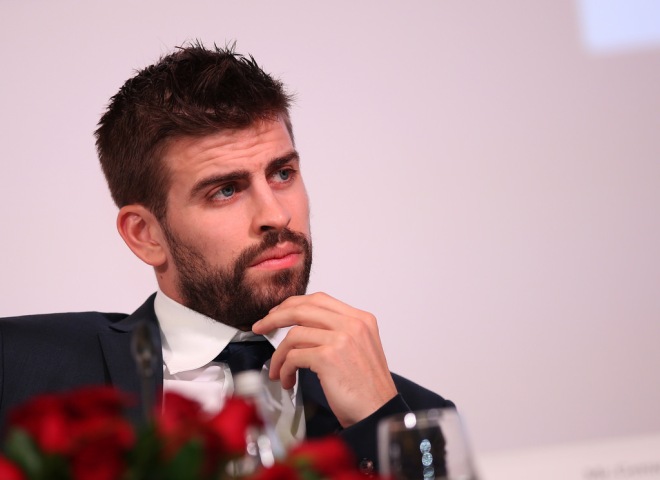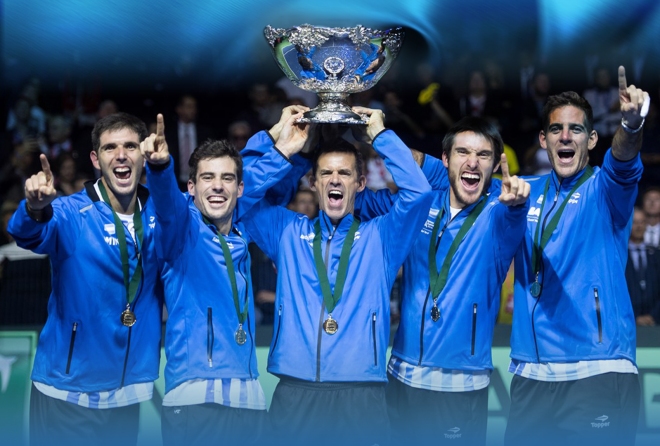
“Today is a historic day,” Gerard Pique beamed. “We are convinced that the agreement ratified by the nations certainly guarantees the future of the Davis Cup and the development of tennis at all levels.”
No sooner had the Pique finished expressing his pride in his brain child – the reformed Davis Cup – were players lining up to distance themselves from it.
“I’m not going to play Davis Cup in November,” said Alexander Zverev, world No5 and the youngest player inside the top 10 of the ATP rankings. “The Davis Cup has some serious issues to think about. I’m very, very sure that a lot of top players won’t play.”
If condemnation from one of the sport’s youngest leading lights wasn’t enough, then two players who account for 34 Grand Slam titles will surely have set alarm bells ringing at the International Tennis Federation (ITF) headquarters.
“I highly doubt I’ll be there,” Roger Federer remarked when pressed about his commitment to next year’s inaugural event. “The Davis Cup should not become the Pique Cup.”
Novak Djokovic soon followed in his skeptism: “I just feel like the date of the Davis Cup is really bad, especially for the top players. Between the two I will prioritise the World Team Cup, because that’s a competition of the ATP.” If it was heartbreaking enough that a player did not want to sign for your team, then it would be doubly hard to take if they were to join your direct rivals.
The public utterances prompted Pique into an emergency trip to Shanghai earlier this year to plead with Federer and Djokovic. Their commitment is key to the survival of new Davis Cup and it was their lack of commitment in recent years, it seems, that wielded the axe on the current version.
Their comments have also sparked raging debates over hypocrisy, with the ITF defending their decision to rubber-stamp Pique’s ideas. Most recently, the debate has descended into a proxy war with Julien Benneteau – who has played a key role in France’s run to the final this year – accusing Federer of undermining the competition.
“The Laver Cup [the annual team event established by Federer] has no sporting legitimacy,” the 36-year-old told French radio. “With regard to the new Davis Cup, he says nothing about the date in November. When the date of September was mentioned [which clashes with the Laver Cup], he woke up and opposed Gerard Pique.”
It is a debate which has become fierce in nature: Pique steadfast in his belief that he can attract the game’s biggest hitters even as their eyes cast flirtations glances towards the beach; and the players resolute that, although the principle is sound, the timing of the competition makes it impossible to get behind.
It is a debate, also, that is likely to rumble on until the first ball is struck in November next year. A debate, too, that bears a striking resemblance to a political tug-of-war in Great Britain: Brexit.

Great Britain’s exit from the European Union (EU) has dominated discourse in the country, to the point the public have grown tired of the same old storylines, witnessing constant political mudslinging between politicians on opposite sides of the debate. Every news piece, it seems, contains a Brexit element. And it is largely because those tasked with ensuring the country’s smooth exit from the EU have made such a pigs ear of it, to the point those same vote-casters have began to wonder what the point of it all actually is.
Reflecting back to the Davis Cup, many are beginning to wonder – and have since the idea was initially floated – whether Pique rushed into the proposal without calculating every permutation. He knows the sport’s three biggest selling stars are all on the wrong side of 30: one has cut the entire clay season from his diet because of its gruelling effects on the body; one has withdrawn or retired from eleven of twelve hard court tournaments this year; and one is just coming back from the biggest injury setback of his career. Although there have been rumours of positive talks between the ITF and ATP about a combined World Cup-styled event, the fact remains that the debut event in twelve months time risks being nothing like what the ITF envisaged when they swallowed Kosmos’ investment.
Likewise, is the current Brexit mess what the 52% of people who voted to leave the EU envisaged? Far from it, polls suggest.
There is no doubt that the current Davis Cup format required tweaks to ensure that apathy did not fester into resentment towards the competition. Pique merely exploited an opportunity to re-shape a competition many were growing sceptical towards. The problem, however, is the extremity of the changes he has proposed, so much so that it is unrecognisable from Davis Cup as we know it. Small wonder Federer branded it the ‘Pique Cup’.
The Swiss is a key star in all of this. He has not played a Davis Cup tie since 2015. True, he has been forced to abbreviate his season in a bid to add even more Grand Slam’s to his burgeoning collection, but it is apparent that he has closed the book on that chapter of his career. His creation of the Laver Cup, in many ways, was a rejection of Davis Cup in its current guise, dragging many of tennis’ stars away from the ITF and towards Federer. Six of the world’s top-10 featured in the second edition of the Laver Cup in Chicago earlier this year. Rafael Nadal played last year, too, just weeks after winning the US Open. “I really hope we have another chance to get together,” Djokovic said after this year’s event. Zverev was similarly gushing in his praise: “There’s a wonderful atmosphere and it’s just unbelievable. We kind of wish the Laver Cup was going on every week of the year.”
What is clear from Zverev’s words is that there is still a desire for a team-based event in the tennis tour. Hence, the ATP Cup – which replaces the Hopman Cup in January 2020 and offers ranking points – has become a tantalising prospect for many players. It retains the tribalism element so conducive to team event’s success and, crucially, hasn’t back itself into an awkward place in the tennis calendar. A ‘soft Brexit’, perhaps, for those of the belief Great Britain’s relationship with the EU required a new definition.
Tennis is entering a period of great uncertainty, with a desire to quicken the pace of the sport to appeal to a younger audience. Tournaments are increasingly subjected to the whims of TV companies, all of whom are desperate to capture our attention spans for just about long enough that we are left craving more.
The various governing bodies treat each with contempt, refusing to compromise for the greater good of the sport. Perhaps we live in an era where there is greater scrutiny on the decision-making within the game, but it is impossible to shake the feeling that one side is eventually going to be forced into submission.
No-one can accurately sketch an image of the sport in twelve months time, as the reformed Davis Cup gears up for its baptism, the first ATP Cup draws closer and the Laver Cup celebrates its third year on the tour. Neither can Great Britain convincingly lay-out what its relationship with the EU will look like after 29 March 2019.
Until then, the squabbles will continue. Sides will be taken. The element of uncertainty will always throw up a thousand different visions. It is a debate that won’t go away.

